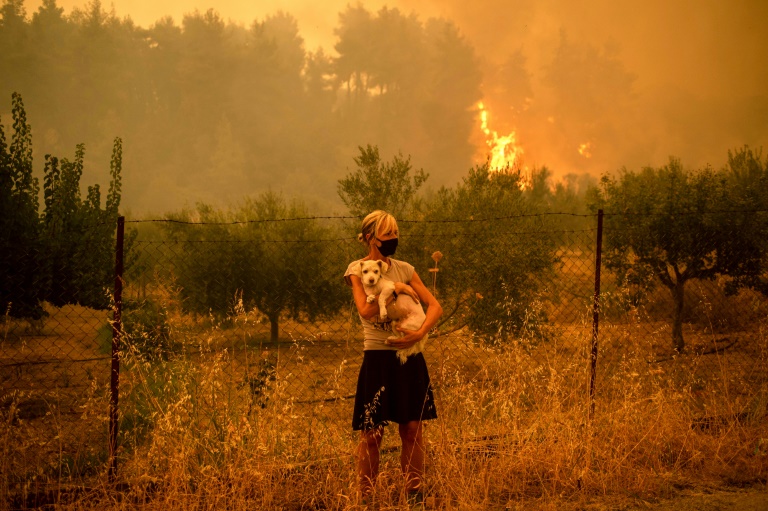Greece breathed a sigh of relief Friday after “mega fires” that have ravaged much of the country were brought under control, but firefighters elsewhere in southern Europe braced for fresh outbreaks.
The scorching temperatures across the Mediterranean have increased the risk of blazes, which have already devastated parts of Italy, Turkey, Algeria and Tunisia, with the bulk of Spain and Portugal’s regions put on high alert for wildfires.
Rising temperatures and increased dryness due to changing rainfall patterns have created the ideal conditions for forest fires, with the five-year period to 2019 “unprecedented” for fire, especially in Europe and North America, according to the World Meterological Organization (WMO).
Scientists say longer and more intense heatwaves due to climate warming are leading to out-of-control wildfires that inflict unprecedented material and environmental damage.
Although rain and a drop in temperatures helped firefighters in Greece gain a hold on the active fronts on the island of Evia and the Arcadia region, which have burned more than 100,000 hectares, winds forecast this weekend increased the likelihood of new flare-ups, authorities said.
The huge multinational force assisting Greece will remain in place, said civil protection spokesman Spyros Georgious.
“They are helping to monitor the perimeters of burned areas in Evia and Arcadia, which are many kilometres long,” Georgious said.
Prime Minister Kyriakos Mitsotakis has called the fires Greece’s “greatest ecological disaster in decades,” which he linked directly to climate change.
– ‘Difficult’ days ahead –
In Spain on Friday, firefighters managed to tame a blaze in the northeastern Catalonia region that forced the evacuation of a few dozen campers in a protected forest.
But another fire continued to burn near the town of Rubia in the northwest, while temperatures in some southwestern provinces were expected to exceed 46 degrees Celsius (115 Fahrenheit).
In a sign of the potentially shifting front of Europe’s fires, three French Canadair aircraft that had been dispatched to Greece were redeployed to Sicily.
Firefighters have been carrying out hundreds of operations throughout the Italian island, as well as in the southern Calabria region. Meanwhile overnight, about 30 people were evacuated after a large fire broke out in a nature reserve near Tivoli, east of Rome.
Regional authorities on Sicily recorded Europe’s highest ever temperature on Wednesday, of 48.8 degrees Celsius, although this still has to be officially confirmed.
Scorching temperatures that have sent tourists in the major cities flocking to fountains and ice cream shops were forecast to continue into the weekend across Italy.
Bob Stefanski, the WMO’s head of applied climate services, said it was seeking to verify the Sicily record, adding: “We need to prepare for the eventuality for the records to be broken, with temperatures above 50 degrees Celsius in Europe in the future.”
In Portugal, the government placed 14 of the 18 regions under a fire alert, with Prime Minister Antonio Costa warning the next few days would be “difficult”.
The southern shore of the Mediterranean has not been spared, as firefighters have continued to battle blazes that already killed 71 people in northern Algeria. Dozens of fires have been recorded since Monday in Tunisia.
In Turkey, which has barely recovered from deadly fires, at least 27 people died in flooding in the north of the country.









